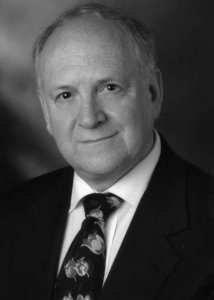William Dunkerley
William Dunkerley is a media business analyst and consultant, and author of The Phony Litvinenko Murder.
The British Litvinenko spy affair has turned into a British government scandal. Sir Robert Owen, the coroner in this still-open 2006 death case, has submitted false and misleading information to the Lord High Chancellor of Great Britain, Chris Grayling. It was Grayling who had nominated Owen for his high-profile coroner post. It is uncertain how Grayling will now react to Owen's misrepresentations.
In a letter just made public on June 21, Owen wrote to Grayling about the Litvinenko case. In it, he said, "It is a highly exceptional situation when the victim of what appears to have been a murder is interviewed by police before he dies, and makes a public statement in which he names those whom he suspects of being responsible for his death…"
According to the public record, Litvinenko made no such statement to the police. It is true that there was a written public statement attributed to Litvinenko that was released after his death. But that document has been shown to be a fraud.
Shortly after Litvinenko's death, Alexander Goldfarb, a business associate, claimed Litvinenko had dictated a deathbed allegation that Russian president Vladimir Putin had poisoned him. Goldfarb produced what he purported was a signed copy of that statement. The authenticity of the document was called into question in a report presented at the 2007 Congress of the International Federation of Journalists. Subsequently, Goldfarb confessed that the words in the so-called deathbed statement were actually his, not Litvinenko's.
So in just one sentence, Owen presented two glaring misrepresentations to the Lord Chancellor. First there is the suggested linkage between the police interview and Litvinenko naming someone he suspected of being responsible for his impending death. Second is the representation that the cited statement had any authenticity.
This isn't the first time that Owen's actions have been problematic. He was hired to ascertain the cause and manner of death in the Litvinenko case. That means he is supposed to rule on what caused Litvinenko to die. Was it from radiation poisoning as has been reported in media accounts? Or was there some other cause? The manner of death refers to whether or not it was a homicide, suicide, accident, or if is not possible to determine which.
Instead of doing his job, however, Owen has been conducting a rogue criminal investigation under the guise of a coroner's inquest. The British rules for coroners specifically prohibit them from doing that. But Owen nonetheless has persisted in his quest to find a guilty party. The fact that it's never been officially determined that Litvinenko was murdered hasn't deterred Owen.
After it was publically revealed that Owen had gone rogue in his coroner's inquest, he apparently found it necessary to find some way of justifying his so-far illegitimate criminal investigation. That's where his letter to the Lord Chancellor came in. Owen came right out and asked Grayling to call a halt to the coroner's inquest, and appoint Owen as Chair of a Public Inquiry that would take over without the limitation coroners face regarding investigating criminality. He wants to keep his current staff and place of work, and just continue on, only wearing a different hat.
Owen's scheme is certainly crafty. But there is a major problem with it. The switcheroo may never lead to a public verdict on the cause and manner of death. That's because the term "Public Inquiry" is a misnomer. It is literally possible to conduct such an inquiry in complete secrecy, behind closed doors.
A related point is that in Owen's letter to Grayling, he states that Litvinenko's death "appears to have been a murder." That sounds like he's already made up his mind. Is it safe to put a guy in that frame of mind in charge of a supposedly fair and objective inquiry that may be conducted in secret?
Owen actually tipped his own hand in his letter to Grayling. He said, "I regard investigation of the 'preventability' and 'Russian State responsibility' issues as being of central importance in this case." "Preventability" refers to a theory that the British government had foreknowledge of Litvinenko being in mortal jeopardy and failed to protect him. "Russian State responsibility" refers to the deathbed statement that turned out to be a hoax. What's clear is that ruling on the cause and manner of death is not a priority for Owen.
Will Grayling see through Owen's ruse, or will he further enable it? The answer to that may lie in just how deep the government scandal surrounding Litvinenko's death really runs. There is reason to suspect that there is a concerted effort to avoid a public finding on the cause and manner of death. Surely since Litvinenko died in November 2006 there has been ample time to examine evidence regarding the cause of death and issue a finding.
Over the past few weeks, many media organizations reported that the Litvinenko inquest is on the verge of collapse. Perhaps that's an understatement. It seems to me there has been an utter collapse in credibility of the British efforts to reach a believable conclusion. As such, the best course would be to simply terminate all proceedings once and for all.



_jpg/250px-ElbeDay1945_(NARA_ww2-121).jpg)







